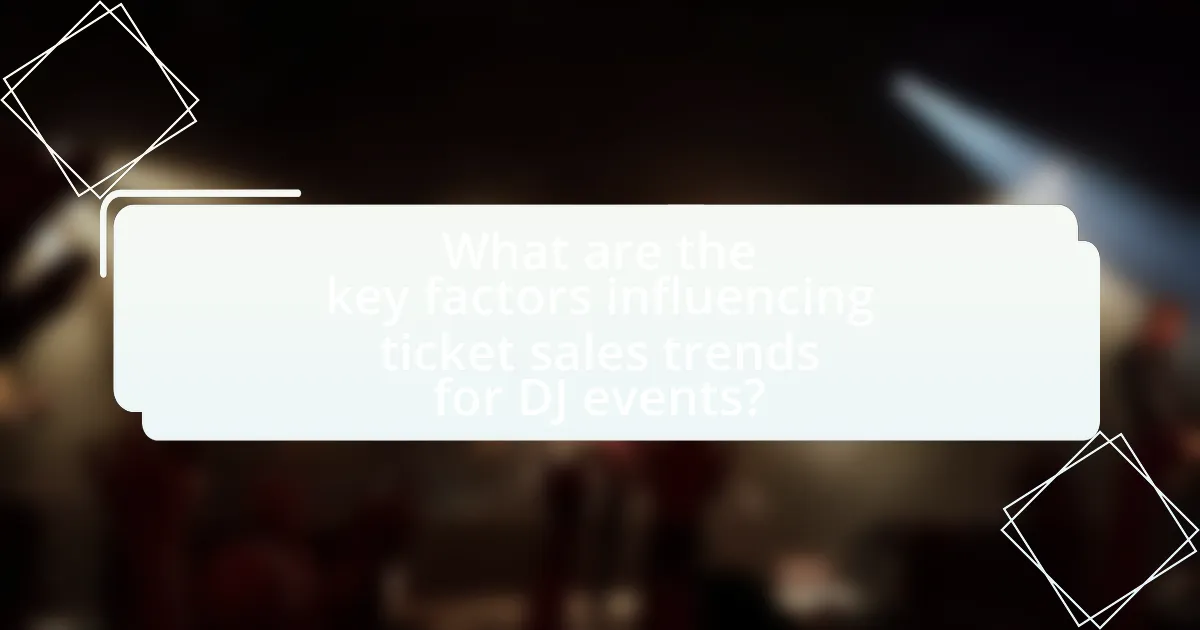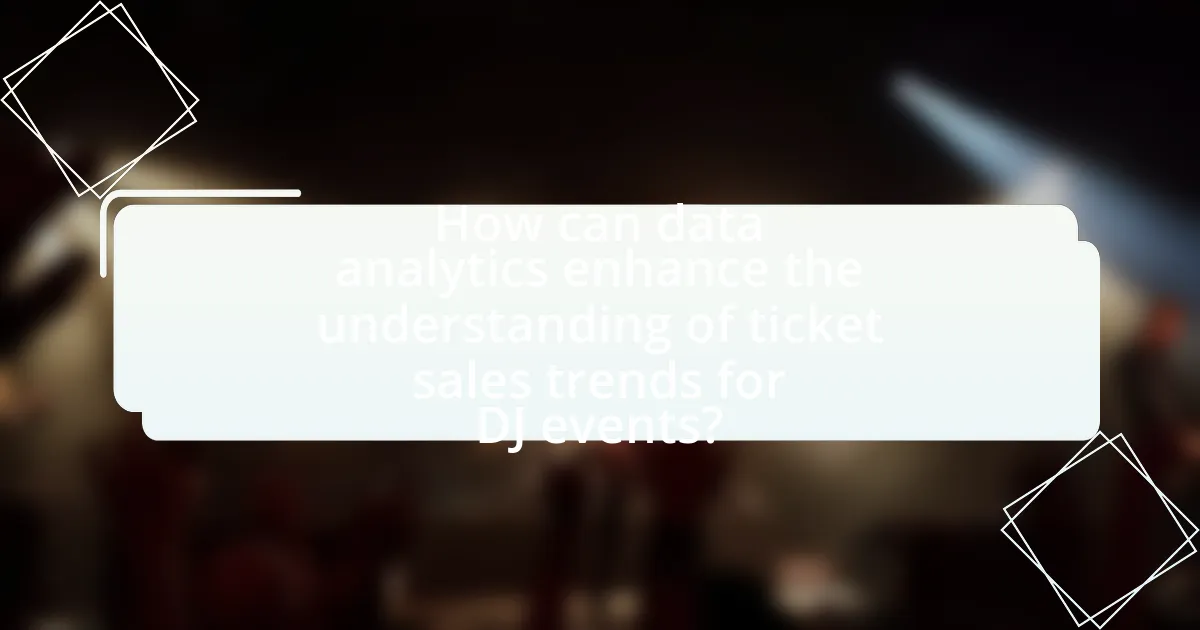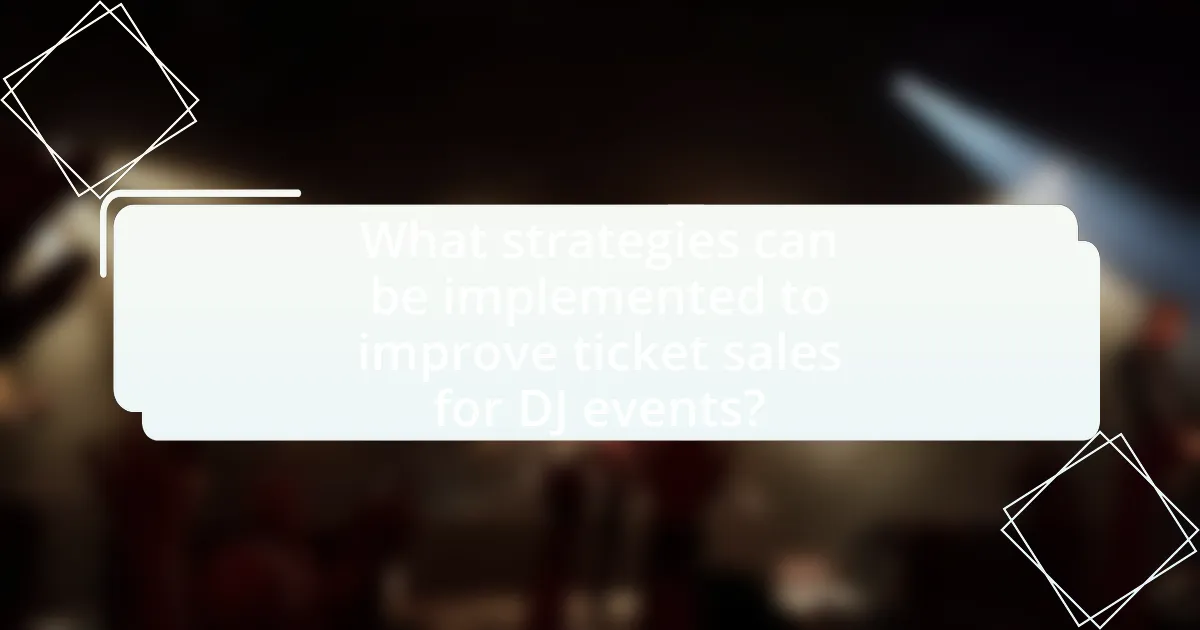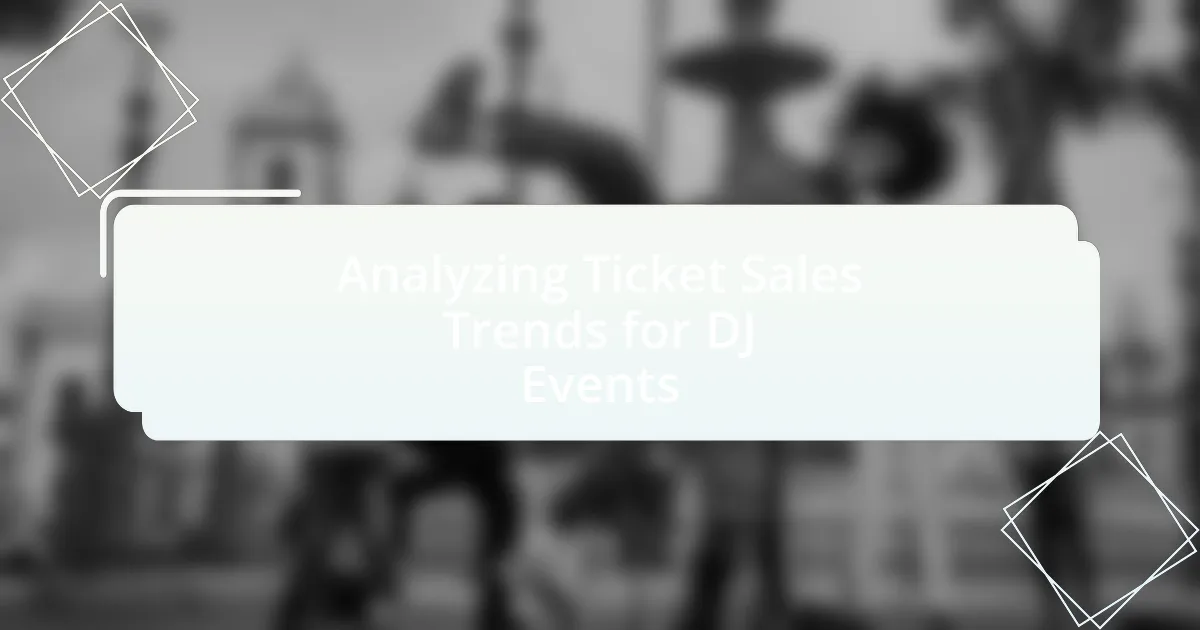The article focuses on analyzing ticket sales trends for DJ events, highlighting key factors that influence these trends, such as artist popularity, venue capacity, pricing strategies, and marketing efforts. It examines the impact of market demographics, including age groups and geographic location, on ticket sales, as well as the role of effective event promotion through social media and other channels. Seasonal trends, pricing strategies, and the use of data analytics for forecasting sales are also discussed, along with best practices for optimizing ticket sales and enhancing customer engagement through feedback and loyalty programs.

What are the key factors influencing ticket sales trends for DJ events?
Key factors influencing ticket sales trends for DJ events include artist popularity, venue capacity, pricing strategies, and marketing efforts. Artist popularity significantly impacts demand; for instance, top-tier DJs like Calvin Harris or Tiësto often sell out large venues quickly due to their established fan bases. Venue capacity also plays a crucial role; larger venues can accommodate more attendees but may require more extensive marketing to fill. Pricing strategies, such as early bird discounts or tiered pricing, can affect consumer purchasing behavior, with studies showing that lower initial prices can boost early sales. Finally, effective marketing campaigns, including social media promotions and partnerships with influencers, have been shown to increase visibility and drive ticket sales, as evidenced by the success of events like Tomorrowland, which leverage extensive online engagement to sell tickets rapidly.
How do market demographics affect ticket sales for DJ events?
Market demographics significantly influence ticket sales for DJ events by determining the target audience’s preferences, spending power, and attendance behavior. For instance, younger demographics, particularly those aged 18-34, are more likely to attend electronic music events, as evidenced by a 2020 report from the Electronic Music Industry, which indicated that 70% of festival-goers fall within this age range. Additionally, geographic factors, such as urban versus rural settings, affect accessibility and interest levels, with urban areas typically showing higher ticket sales due to greater population density and cultural engagement. Furthermore, income levels within a demographic can dictate ticket pricing strategies; higher-income areas may support premium pricing, while lower-income regions may necessitate more affordable options to drive sales. Thus, understanding and analyzing these demographic factors is crucial for optimizing marketing strategies and maximizing ticket sales for DJ events.
What age groups are most likely to attend DJ events?
Individuals aged 18 to 34 are the most likely to attend DJ events. This demographic represents a significant portion of the audience, as studies indicate that around 70% of attendees at electronic dance music festivals fall within this age range. Additionally, data from ticket sales platforms shows that events targeting this age group consistently sell out faster than those aimed at older audiences, highlighting their strong interest in DJ performances and nightlife culture.
How does location impact ticket sales for DJ events?
Location significantly impacts ticket sales for DJ events by influencing audience accessibility, local demand, and competition. For instance, events held in urban areas with high population density typically experience higher ticket sales due to greater potential attendance. A study by the Night Time Industries Association found that events in cities like London and New York can sell out faster than those in rural areas, highlighting the correlation between location and ticket demand. Additionally, proximity to nightlife hubs and transportation options enhances accessibility, further driving sales. Conversely, locations with limited nightlife or competing events may see lower ticket sales, as evidenced by data from various event platforms that track sales trends across different regions.
What role does event promotion play in ticket sales trends?
Event promotion significantly influences ticket sales trends by increasing visibility and generating interest among potential attendees. Effective promotional strategies, such as social media marketing, email campaigns, and partnerships with influencers, can lead to higher ticket sales by reaching a broader audience. For instance, a study by Eventbrite found that events with robust promotional efforts sold 30% more tickets compared to those with minimal marketing. This correlation highlights the importance of targeted promotion in driving ticket sales for DJ events, as it not only informs potential attendees but also creates a sense of urgency and excitement around the event.
Which marketing channels are most effective for promoting DJ events?
Social media platforms, particularly Facebook and Instagram, are the most effective marketing channels for promoting DJ events. These platforms allow for targeted advertising, enabling promoters to reach specific demographics interested in music and nightlife. According to a study by Eventbrite, 93% of event creators use social media to promote their events, highlighting its significance in driving ticket sales. Additionally, email marketing remains a strong channel, with a reported return on investment of $42 for every dollar spent, making it a valuable tool for reaching dedicated fans and past attendees.
How does social media influence ticket sales for DJ events?
Social media significantly influences ticket sales for DJ events by enhancing visibility and engagement with potential attendees. Platforms like Instagram, Facebook, and Twitter allow DJs and event organizers to promote events, share updates, and interact with fans, creating a sense of community and excitement. According to a study by Eventbrite, 93% of event creators reported that social media is an effective tool for driving ticket sales, highlighting its role in reaching wider audiences. Additionally, targeted advertising on these platforms can increase ticket sales by reaching specific demographics interested in electronic music, further validating the impact of social media on ticket sales for DJ events.
What seasonal trends can be observed in DJ event ticket sales?
DJ event ticket sales typically experience seasonal trends, with peak sales occurring during summer months and around major holidays. This pattern is influenced by factors such as outdoor festivals, increased nightlife activity, and vacation periods, which drive higher attendance. For instance, a report from Eventbrite indicates that summer months, particularly June through August, see a 30% increase in ticket sales compared to winter months. Additionally, holiday seasons like New Year’s Eve and Halloween also show spikes in sales, as people seek entertainment options during celebrations. These trends highlight the importance of timing in marketing and planning DJ events to maximize ticket sales.
How do holidays and festivals impact ticket sales for DJ events?
Holidays and festivals significantly boost ticket sales for DJ events due to increased consumer spending and heightened social activity. During these periods, individuals are more likely to seek entertainment options, leading to higher attendance rates at events. For instance, a study by Eventbrite found that events scheduled around holidays see ticket sales increase by up to 30% compared to non-holiday periods. Additionally, festivals often coincide with holidays, creating a concentrated demand for DJ performances, which further drives ticket sales. This trend is supported by data indicating that major holidays like New Year’s Eve and Independence Day consistently rank among the highest for event attendance in the nightlife sector.
What time of year sees the highest ticket sales for DJ events?
The time of year that sees the highest ticket sales for DJ events is during the summer months, particularly June through August. This period aligns with numerous music festivals and outdoor events, which typically attract larger crowds. According to data from the Electronic Music Industry Report, summer festivals account for approximately 60% of annual ticket sales for DJ performances, highlighting the significant impact of seasonal events on overall sales.

How can data analytics enhance the understanding of ticket sales trends for DJ events?
Data analytics enhances the understanding of ticket sales trends for DJ events by providing insights into consumer behavior, preferences, and purchasing patterns. By analyzing historical sales data, event organizers can identify peak sales periods, popular ticket pricing strategies, and demographic information about attendees. For instance, a study by Eventbrite found that events with targeted marketing based on data analytics saw a 30% increase in ticket sales. Additionally, predictive analytics can forecast future sales trends, allowing organizers to optimize marketing efforts and adjust pricing strategies accordingly. This data-driven approach leads to more informed decision-making and improved event profitability.
What types of data should be analyzed to understand ticket sales trends?
To understand ticket sales trends, one should analyze historical sales data, customer demographics, event marketing effectiveness, and external factors such as economic conditions. Historical sales data reveals patterns in ticket purchases over time, indicating peak sales periods and popular events. Customer demographics provide insights into the target audience, helping to tailor marketing strategies. Analyzing event marketing effectiveness assesses which promotional channels yield the highest ticket sales, while external factors like economic conditions can influence consumer spending behavior. For instance, a study by Eventbrite found that 70% of ticket buyers are influenced by social media marketing, highlighting the importance of analyzing marketing data alongside sales trends.
How can sales data be segmented for better insights?
Sales data can be segmented for better insights by categorizing it based on various criteria such as demographics, purchase behavior, time periods, and geographic locations. Segmenting by demographics allows for understanding different customer profiles, while analyzing purchase behavior reveals patterns in buying habits. Time-based segmentation, such as daily, weekly, or monthly sales, helps identify trends over specific periods. Geographic segmentation provides insights into regional preferences and performance. For instance, a study by the Event Marketing Institute found that targeted marketing based on demographic segmentation can increase engagement rates by up to 50%, demonstrating the effectiveness of this approach in enhancing sales insights.
What role does customer feedback play in analyzing ticket sales trends?
Customer feedback plays a crucial role in analyzing ticket sales trends by providing insights into customer preferences and satisfaction levels. This feedback helps event organizers identify which aspects of their events resonate with attendees, such as artist lineups, venue choices, and pricing strategies. For instance, a study by Eventbrite found that 78% of event organizers who actively sought customer feedback reported improved ticket sales as a result of implementing changes based on that feedback. By systematically analyzing this data, organizers can adjust their marketing strategies and enhance the overall attendee experience, ultimately leading to increased ticket sales and repeat attendance.
How can predictive analytics be used to forecast ticket sales for DJ events?
Predictive analytics can be used to forecast ticket sales for DJ events by analyzing historical sales data, customer demographics, and market trends. By employing statistical models and machine learning algorithms, event organizers can identify patterns and correlations that influence ticket purchasing behavior. For instance, a study by the Eventbrite Research Team found that analyzing past event attendance and ticket sales can improve forecasting accuracy by up to 30%. This data-driven approach allows for better inventory management and targeted marketing strategies, ultimately leading to increased ticket sales and optimized event planning.
What tools are available for predictive analytics in ticket sales?
Tools available for predictive analytics in ticket sales include Tableau, Microsoft Power BI, and Google Analytics. These tools enable event organizers to analyze historical sales data, forecast future ticket sales, and identify trends. For instance, Tableau allows users to visualize data and create dashboards that highlight sales patterns, while Microsoft Power BI integrates with various data sources to provide real-time insights. Google Analytics offers tracking capabilities that help understand customer behavior and optimize marketing strategies. These tools are widely used in the industry, demonstrating their effectiveness in enhancing ticket sales strategies.
How accurate are predictive models in forecasting ticket sales trends?
Predictive models in forecasting ticket sales trends are generally accurate, with many achieving precision rates between 70% to 90%. For instance, a study by the Journal of Business Research found that machine learning algorithms, when applied to historical sales data, can predict ticket sales with an accuracy of up to 85%. This level of accuracy is supported by the models’ ability to analyze various factors such as past sales, market trends, and consumer behavior, allowing for more informed predictions.
What are the challenges in analyzing ticket sales data for DJ events?
Analyzing ticket sales data for DJ events presents several challenges, including data fragmentation, variability in consumer behavior, and the influence of external factors. Data fragmentation occurs when ticket sales are distributed across multiple platforms, making it difficult to consolidate and analyze comprehensive sales data. Variability in consumer behavior is evident as purchasing patterns can fluctuate significantly based on factors such as event location, artist popularity, and timing, complicating trend analysis. Additionally, external factors like economic conditions, competing events, and social media trends can impact ticket sales unpredictably, further complicating the analysis process. These challenges necessitate advanced analytical techniques and robust data integration strategies to derive meaningful insights from ticket sales data.
How can data privacy concerns affect ticket sales analysis?
Data privacy concerns can significantly hinder ticket sales analysis by limiting the availability and granularity of consumer data. When organizations prioritize data privacy, they may restrict access to personal information, which is crucial for understanding customer preferences and behaviors. For instance, regulations like the General Data Protection Regulation (GDPR) impose strict guidelines on data collection and usage, leading to reduced datasets for analysis. This limitation can result in less accurate forecasting of ticket sales trends, as businesses may lack insights into demographic factors and purchasing patterns that drive sales for DJ events. Consequently, the inability to analyze comprehensive data can impair strategic decision-making and marketing effectiveness.
What common pitfalls should be avoided in ticket sales data analysis?
Common pitfalls to avoid in ticket sales data analysis include neglecting data quality, failing to segment the audience, and overlooking external factors. Neglecting data quality can lead to inaccurate insights; for instance, using incomplete or erroneous data can skew results and misinform decision-making. Failing to segment the audience prevents a nuanced understanding of different customer behaviors, which is crucial for targeted marketing strategies. Overlooking external factors, such as economic conditions or competing events, can result in misinterpretation of sales trends, as these elements significantly influence ticket demand.

What strategies can be implemented to improve ticket sales for DJ events?
To improve ticket sales for DJ events, implementing targeted marketing strategies is essential. Utilizing social media platforms to engage with potential attendees can significantly increase visibility and interest; for instance, 54% of event attendees discover events through social media. Collaborating with influencers in the music scene can also amplify reach, as their endorsements can attract their followers to the event. Additionally, offering early bird discounts and group ticket packages can incentivize purchases, as studies show that limited-time offers create urgency and increase conversion rates. Finally, leveraging data analytics to understand audience preferences and tailoring the event experience accordingly can enhance customer satisfaction and drive ticket sales.
How can pricing strategies influence ticket sales for DJ events?
Pricing strategies significantly influence ticket sales for DJ events by determining perceived value and accessibility. For instance, tiered pricing can create urgency and exclusivity, leading to higher sales as early bird tickets often sell out quickly, demonstrating demand. Research shows that events with dynamic pricing, which adjusts based on demand, can increase revenue by up to 20% compared to fixed pricing models. Additionally, offering discounts for group purchases can enhance sales volume, as seen in events where group ticket sales accounted for 30% of total sales. Thus, effective pricing strategies directly correlate with increased ticket sales and overall event profitability.
What are the benefits of early bird pricing for DJ events?
Early bird pricing for DJ events offers significant benefits, primarily by incentivizing early ticket purchases, which helps secure initial revenue and gauge interest levels. This pricing strategy often results in increased ticket sales, as attendees are motivated by lower prices, leading to higher overall attendance rates. Additionally, early bird pricing can create a sense of urgency, encouraging potential attendees to commit sooner rather than later. According to a study by Eventbrite, events that implement early bird pricing can see up to a 30% increase in ticket sales compared to those that do not. This approach not only boosts cash flow for event organizers but also helps in planning and logistics by providing clearer attendance projections.
How can dynamic pricing be applied to maximize ticket sales?
Dynamic pricing can be applied to maximize ticket sales by adjusting prices based on real-time demand, competitor pricing, and customer behavior. This strategy allows event organizers to optimize revenue by increasing prices during high demand periods and lowering them when demand is low. For instance, a study by the Harvard Business Review found that airlines using dynamic pricing increased their revenue by up to 10% by adjusting ticket prices based on booking patterns and remaining seat availability. By implementing similar algorithms for DJ events, promoters can effectively respond to market conditions, ensuring that ticket prices reflect the perceived value and urgency, thus maximizing sales.
What promotional tactics can boost ticket sales for DJ events?
Utilizing social media marketing effectively can significantly boost ticket sales for DJ events. Engaging content, targeted ads, and influencer partnerships on platforms like Instagram and Facebook can reach a wider audience. For instance, a study by Eventbrite found that events promoted through social media saw a 30% increase in ticket sales compared to those that did not utilize these platforms. Additionally, offering early bird discounts and exclusive VIP packages can create urgency and incentivize purchases, further enhancing sales performance.
How can partnerships with local businesses enhance ticket sales?
Partnerships with local businesses can enhance ticket sales by creating mutually beneficial promotions that attract a wider audience. For instance, when a local restaurant offers discounts to customers who purchase tickets to a DJ event, it incentivizes dining and event attendance simultaneously. This strategy not only increases ticket sales but also drives foot traffic to the restaurant, fostering community engagement. According to a study by the National Endowment for the Arts, events that collaborate with local businesses see a 20% increase in attendance, demonstrating the effectiveness of such partnerships in boosting ticket sales.
What role do loyalty programs play in increasing ticket sales for DJ events?
Loyalty programs significantly enhance ticket sales for DJ events by incentivizing repeat attendance and fostering customer loyalty. These programs often offer rewards such as discounts, exclusive access, or special experiences, which motivate attendees to purchase tickets more frequently. For instance, a study by the Event Marketing Institute found that 78% of consumers are more likely to attend events if they are part of a loyalty program, demonstrating a direct correlation between loyalty initiatives and increased ticket sales. Additionally, loyalty programs can create a sense of community among attendees, further driving engagement and repeat purchases.
What best practices should be followed to optimize ticket sales for DJ events?
To optimize ticket sales for DJ events, implement targeted marketing strategies that leverage social media, email campaigns, and partnerships with influencers. Targeted marketing increases visibility and engagement, as evidenced by a study from Eventbrite, which found that events promoted through social media channels saw a 30% increase in ticket sales compared to those that did not utilize these platforms. Additionally, offering early bird pricing and group discounts can create urgency and incentivize purchases, leading to higher sales volumes. According to a report by Statista, events that employed tiered pricing strategies experienced a 25% boost in overall ticket revenue.
How can event organizers effectively utilize feedback to improve future sales?
Event organizers can effectively utilize feedback by systematically collecting and analyzing attendee responses to identify areas for improvement in future events. This process involves using surveys, social media comments, and direct communication to gather insights on aspects such as ticket pricing, event timing, and overall experience. For instance, a study by Eventbrite found that 70% of attendees are willing to provide feedback if it leads to better future events, highlighting the importance of engaging with the audience. By implementing changes based on this feedback, such as adjusting pricing strategies or enhancing the event experience, organizers can increase customer satisfaction and drive higher ticket sales in subsequent events.
What are the key takeaways for maximizing ticket sales for DJ events?
To maximize ticket sales for DJ events, focus on targeted marketing strategies, early bird pricing, and engaging social media campaigns. Targeted marketing ensures that promotions reach the right audience, increasing the likelihood of ticket purchases. Early bird pricing incentivizes early sales, often resulting in higher overall attendance, as evidenced by events that report up to a 30% increase in sales when early discounts are offered. Engaging social media campaigns create buzz and foster community, leading to organic promotion and increased ticket sales, as seen in case studies where social media engagement correlates with a 20% rise in ticket sales.

Leave a Reply